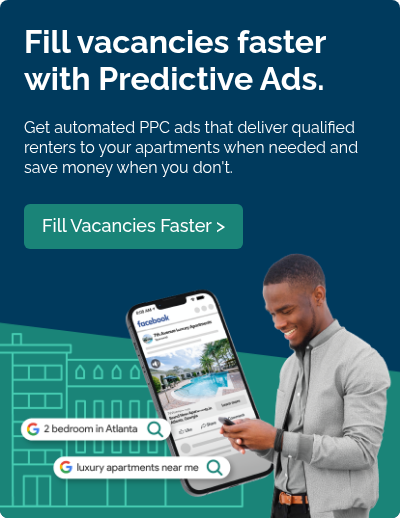The benefits are numerous when it comes to running digital ads for your apartment communities.
But the questions with apartment PPC almost always come down to money.
How much should I be prepared to budget for my apartment's digital ads?
What will this ultimately cost me?
We've got your answers.
What Real Apartment Communities Are Budgeting for Digital Ads in 2025
We ran a quick snapshot of our clients' daily high and low recommended budgets for Google Ads and Meta Ads in June 2025—right in the heart of the busy leasing season.
Depending on unit count, stabilized A-class properties spend between $425 and $2,650 per month on average for their PPC ads, B-class properties spend between $300 and $2,400 monthly, and C-class properties spend between $185 and $1,280 monthly.
Daily Apartment PPC Budgets For
Google Ads (June 2025)
| Unit Count | A-Class Property | B-Class Property | C-Class Property |
|---|---|---|---|
|
0-100 |
High: $50 Low: $12 |
High: $34 Low: $9 |
High: $23 Low: $6 |
|
101-200 |
High: $50 Low: $13 |
High: $40 Low: $11 |
High: $30 Low: $8 |
|
201-300 |
High: $64 Low: $21 |
High: $48 Low: $16 |
High: $31 Low: $12 |
|
301+ |
High: $68 Low: $23 |
High: $62 Low: $20 |
High: $32 Low: $14 |
Daily Apartment PPC Budgets For
Meta Ads (June 2025)
| Unit Count | A-Class Property | B-Class Property | C-Class Property |
|---|---|---|---|
|
0-100 |
High: $17 Low: $2 |
High: $12 Low: $1 |
High: $7 Low: $0 |
|
101-200 |
High: $17 Low: $2 |
High: $13 Low: $1 |
High: $10 Low: $0 |
|
201-300 |
High: $19 Low: $7 |
High: $14 Low: $3 |
High: $11 Low: $1 |
|
301+ |
High: $19 Low: $7 |
High: $17 Low: $6 |
High: $10 Low: $3 |
Daily Apartment PPC Budgets For
Google & Meta Ads Combined (June 2025)
| Unit Count | A-Class Property | B-Class Property | C-Class Property |
|---|---|---|---|
|
0-100 |
High: $67 Low: $14 |
High: $48 Low: $10 |
High: $30 Low: $6 |
|
101-200 |
High: $67 Low: $15 |
High: $53 Low: $12 |
High: $40 Low: $8 |
|
201-300 |
High: $83 Low: $31 |
High: $62 Low: $19 |
High: $42 Low: $13 |
|
301+ |
High: $87 Low: $30 |
High: $79 Low: $26 |
High: $42 Low: $17 |
These are the benchmarks for the maximum amount you could expect to budget each month on your apartment's digital ads, factoring in unit count and property class.
Typically, the more units in your community, the more you'll need to be willing to spend because you have a greater need for traffic and awareness online.
The same rules apply to your property class. Marketers in luxury communities typically spend double or more on digital ads than a C-class property would to compete for traffic and awareness.
(Note: Many of our clients have eliminated many or all of their ILS packages and moved the bulk of their marketing budgets to PPC. These numbers also only reflect stabilized communities; lease-ups were not included in our count.)
In a lease-up? It would be best to spend 2.5x to 3x higher on your ads each day because you have much higher vacancy and need to fill units as fast as possible to avoid significant lost rent revenue. Once the lease-up is over and your community occupancy is more stabilized, you can dial down your spend closer to the benchmarks for properties matching your class and unit count.
Is your ad spend higher? Google and Meta prioritize relevant ads using Quality Score and AdRank metrics, valuing ad effectiveness over how much you pay. Look at your keyword targeting and ad design. If it lacks clear calls-to-action, or it sends traffic to irrelevant or broken landing pages on your website, those could influence your higher costs.
Need help with your apartment's PPC strategy?
Predictive Advertising is a multifamily-specific PPC software that automatically adapts your digital ads to your upcoming vacancy, generating qualified leads when and where you need it most while saving dollars when you don't. Schedule a demo to learn more!



